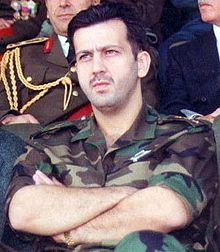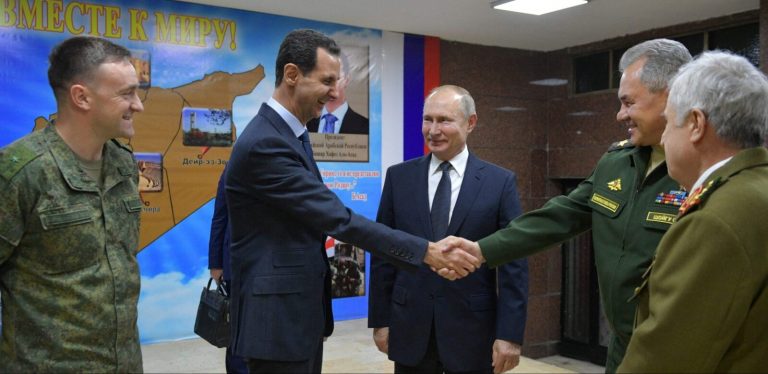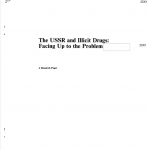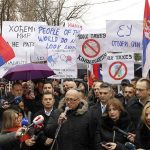In-fighting erupts between Syrian intelligence and army in Damascus. Violent clashes broke out between Syrian regime intelligence forces and local militias affiliated with the army’s 4th Division and national defense in Damascus’ countryside, local media sources reported. Sporadic fighting reportedly broke out for the third consecutive day in the Daf Al-Shouk region between militiamen affiliated with the 4th Division and the national defense on the one hand, and security formations from the Palestine Branch of the Syrian military intelligence on the other. This came after the 4th Division and the national defense refused to hand over their weapons and end the military tasks assigned to them in the region.
The 4th Armoured Division ( Al-Firqa ar-Rābiʿah) is an elite formation of the Syrian Army. The Division is drawn mostly from members of the same Alawite group as the Assad family. The Division has a military base in the South of Damascus, which covers about 35 sq mi and includes several mountain bunkers. Its main entrance gate is located next to a village called Al Horjelah. The Division’s commander is Maher al-Assad, the younger brother of Bashar Assad.
Maher was not chosen to lead the country by his father Hafez because he allegedly is said to have thought him to be more cruel than Bashar. He is known for his notorious atrocities against protesters and opposition forces during the Arab Spring protests and later in the civil war, too.
There are signs of a serious conflict between Bashar al-Assad and the Syrian oligarch and Bashar, Maher and Busher’s cousin Rami Makhlouf. Government takedown of Makhlouf’s empire as well as freezing his funds, the government has suspended trading of his telecoms company on the stock market.
A rift between Mr Al Assad and Mr Makhlouf became public in May, exposing the financial core of Syria’s Alawite-dominated regime and a huge business network to which the two cousins are associated.
Rami Makhlouf said last week that security forces had arrested his female staff to force him to relinquish his assets. We believe that female staff arrests are a signal related to the sanctions imposed against Bashar Assad’s wife and might indicate that the president considers Makhlouf to be guilty of financial losses of the Assad family or unfair distribution of financial and tangible assets.

The developments inside Assad’s entourage escalated after Donald Trump imposed new sanctions, the so-called Caesar Act, against the entourage of the Syrian President and his wife, who according to Pompeo is “one of Syria’s most notorious war profiteers,” She is something akin to “the business head of the family” and was involved in the highly public conflict with Rami.
The open source scenario suggests the clashes could have been triggered by violations of local militias including kidnappings, looting and theft. The Syrian armed forces and militias are obviously becoming highly decentralized. Their commanders control not only security in certain territories, but also economic activity, are engaged in robberies and violence in order to obtain financial profit. Such developments caused local residents to appeal to Damascus, so that the high command decided to disarm the militia groups. This task was entrusted to security formations from the Palestine Branch of the Syrian military intelligence.
Russia has been seeking to chisel away at Maher al-Assad for about a month, too. His confrontations with the Russians surfaced tangibly in the lucrative ‘check-point business.’ According to the Syrian Observatory for Human Rights, Russia ordered all armed groups affiliated with the 4th Armored Division to withdraw from the checkpoints across Syria. Maher failed to comply with these demands and ordered his men to keep the checkpoints as usual. The 4th Armored Division is more than a maneuver unit. Based on the Baath regime’s political-military characteristics, it is the organized manifestation of Maher al-Assad’s dominance across the country through military might. Moscow’s plans of building a centralized, regular doctrinal order of battle for the SAA and organizing a ‘normal’ armed force with no organic ties to tycoons and black-market businesses would be tantamount to curbing Maher’s privileged power position, something that he cannot settle for.
In such a way, the Kremlin seeks to chisel away at the Syrian president’s entourage as much as possible, creating a vacuum around him. As a result, Bashar Assad will become entirely dependent on Moscow, and the Kremlin will gain a monopoly influence on Assad. Russia is highly possible to have orchestrated an attack against Makhlouf, too.
The task to monopolize Russia’s influence on the Syrian president might be accomplished by convincing him of the need to disarm the armed groups Makhlouf has influence over. Rami Makhlouf participated in financing the militia affiliated with Maher Assad’s 4th Division.
Consequently, the president is forced out to disarm the groups likely to side with Makhlouf in a rift between them amid economic pressure and Makhlouf’s empire takedown.
If Maher al-Assad does not make steps to protect the units affiliated with the 4th Division, he is likely to side with the President and is loyal to him. Meanwhile, a disarmament order was passed on to the Military Intelligence Directorate (Shu’bat al-Mukhabarat al-‘Askariyya), and the units were not relocated to another region. Official Damascus also did not set the task for Maher himself to bring the subordinate units under control.
This fact is likely to speak for either lack of trust between the president and his younger brother, or high level of Russia’s influence on Syrian military intelligence. If Maher tries to hamper their disarmament, the scenario might feature drastic measures by the Kremlin up to Maher’s killing.




